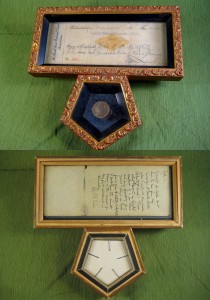I’ve recently picked up this moderately curious framed receipt dated April 2, 1901, for the deposit of 1546 (and 85/100) Francs, payable on the Fourth Street National Bank for the Comptoir National d’Escompte de Paris, with a signed autograph note by John P. B. Sinkler on the verso explaining the keepsake’s significance in the Philadelphia architect’s career.
(The double-sided contemporary gilt frame includes an attached matching pentagon-shaped mirrored shadow box displaying what appears to be a mounted 1791 French 12 denier coin.)
Sinkler’s note on the verso of the slip reads,
Receipt for cash sent home by me from my winnings at Monte Carlo where I went with my uncle Robert C. H. Brock. I won about $1600.00 on limited venture of a few dollars and as a result of my gains I stayed in Paris for a year to study architecture. I sent home the amount shown on this receipt for my first investment in securities. John P. B. Sinkler.
Sinkler–an 1898 graduate of Penn with a B.S. in Architecture–did indeed supplement his undergraduate training with study at the École des Beaux-Arts, though it appears that such biographical notes as are easily available make no mention that this training was funded by a fortuitous turn at the tables. Sinkler was back in Philadelphia and taking on projects as early as 1902; the longtime partnership of Bissell & Sinkler was established in 1906, interrupted only by Sinkler’s stints as City Architect for Philadelphia. (His fairly well-known Germantown Town Hall is a nice example of a Beaux-Arts design.) That a member of a prominent Philadelphia family like the Sinklers would have this hanging up somewhere like the dollar bill above a diner cash register has a certain sentimental charm.
But one of the things I find most curious about this piece is that Sinkler was also involved at an early date in the restoration and preservation efforts around Independence Hall. That the city of Benjamin Franklin–who was instrumental of course in securing French financial support for the American Revolution–would eventually find its revolutionary heritage preserved in part, however indirectly, by another infusion French funds has a certain pleasing symmetry.

